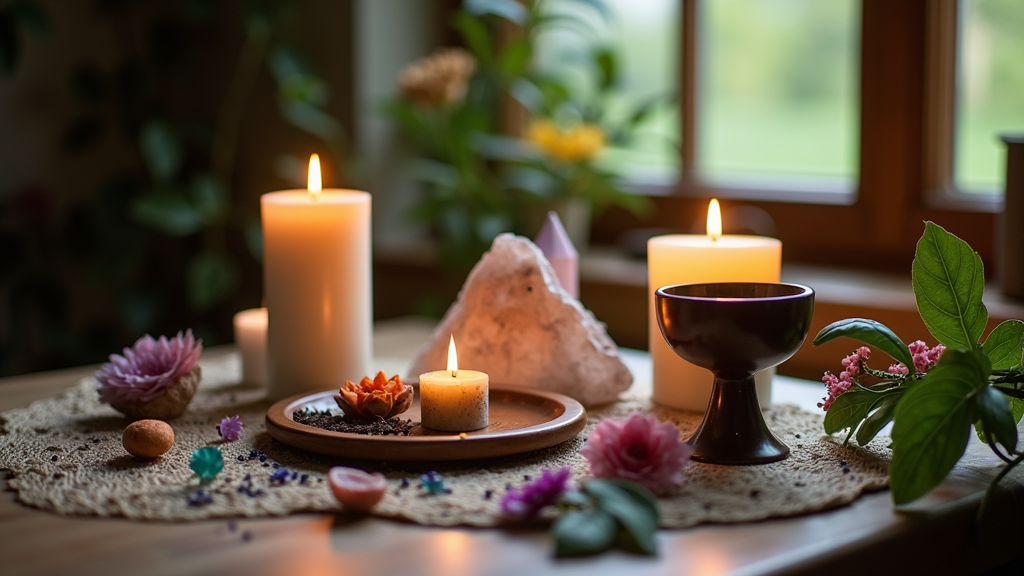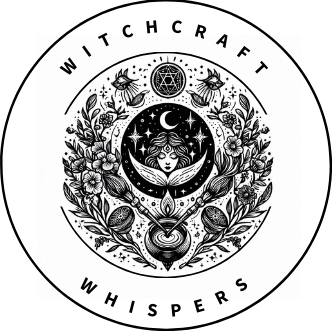 Wicca is a nature-based spiritual path that’s been drawing interest and curiosity for decades. If you’ve ever come across witchy content online or spotted mysterious symbols in bookstores, there’s a good chance you’ve bumped into aspects of Wicca. Starting out can feel a little overwhelming, but with the basics, stepping into this world is way more fun than intimidating.
Wicca is a nature-based spiritual path that’s been drawing interest and curiosity for decades. If you’ve ever come across witchy content online or spotted mysterious symbols in bookstores, there’s a good chance you’ve bumped into aspects of Wicca. Starting out can feel a little overwhelming, but with the basics, stepping into this world is way more fun than intimidating.
Wicca blends old European traditions with a modern focus on harmony, both with nature and with yourself. It covers rituals, seasonal celebrations, and a belief system centered on personal responsibility and spiritual growth. While Wicca often gets grouped together with mysterious or secretive practices, it’s actually approachable and encouraging of self-discovery and mindful living.
This beginner’s guide lays out what Wicca is all about, what Wiccans believe, how rituals look, and how you can get started if you feel called to explore it further. You’ll find it honest, practical, and clear—perfect for anyone who’s new or just a little curious about what Wicca has to offer. If you feel like checking out this mystical side of life, you’re definitely in the right place.
Understanding Wicca: The Basics
Wicca is a modern Pagan religion that first took shape in the mid 20th century. Gerald Gardner is often credited as the main person who brought Wicca into the public eye in the 1950s, but it actually branches off from lots of older traditions and folklore from Europe. Since its founding, Wicca has inspired lots of different offshoots and personal styles, so you might see a wide range of variations and branches, from Gardnerian and Alexandrian Wicca to more eclectic and solitary practices.
At its core, Wicca embraces a reverence for nature, recognizes the cycles of the moon and seasons, and often features a pair of sacred figures: the God and the Goddess. These two deities represent a balance of masculine and feminine energies. Wicca is flexible about what these archetypes mean to each practitioner, so you can picture or connect with them in a way that makes sense to you personally.
You don’t need to be born into Wicca or join any special group to explore it. Anyone interested in its ideas or practices can take part. Learning is ongoing, and personal adaptation is common for most Wiccans. In fact, this flexibility is one of the reasons Wicca feels welcoming to newcomers from all kinds of backgrounds.
What Wiccans Believe
The Wiccan Rede: “An It Harm None, Do What Ye Will”
The phrase above is pretty much the heart of Wiccan ethics. It encourages personal freedom and responsibility, as long as your choices avoid causing harm to others (including yourself, animals, and nature). This guidance influences how Wiccans approach magic, daily life, and interactions with the world around them. The focus is always on doing good and being mindful of the energy you send out.
The Rule of Three
Another idea you’ll run into a lot is the “Threefold Law,” which is sort of like spiritual cause and effect. The basic idea: whatever energy you put out, positive or negative, returns to you three times over. It’s used as a reminder to act thoughtfully and with good intentions. This way, Wicca encourages everyone to make choices with care and look for kindness both inside and outside themselves.
Deities, Nature, and the Divine
Most Wiccans honor both a Goddess and a God, though how these deities are understood can vary widely. Some see them as literal beings, while others see them as symbols of natural forces or aspects of themselves. Nature itself is sacred in Wicca. Trees, rivers, stones, and animals all get respect and attention—not just as parts of the natural world, but as spiritual allies and reminders of life’s mysteries. The waxing and waning of the moon, the changing seasons, and the cycles of birth and renewal all have deep meaning in Wicca, and they inspire a sense of wonder that many find deeply nurturing.
Rituals, Tools, and Practices
Rituals: What They Involve
Rituals in Wicca can be elaborate group ceremonies or simple solo moments at home. They usually have a clear purpose, such as celebrating the change of seasons, giving thanks, or setting intentions for the new moon. Rituals might include lighting candles, chanting, saying prayers, meditating, or working with tools like chalices, wands, or pentacles. The important part is the intention behind each action, rather than the complexity of the ritual itself.
Common Wiccan Tools
- Altar: A small surface where you keep your ritual items. It might have candles, crystals, statues, or natural objects. Your altar can reflect your personality and what you want to attract into your spiritual life.
- Athame: A ritual knife, often used for directing energy. It’s symbolic, not used for physical cutting, and can be as simple as a letter opener or handcrafted blade.
- Chalice: A cup or goblet used in ceremonies, often holding water or wine as an offering. The chalice represents the element of water and the feminine divine.
- Wand: Used for sending energy, especially in spell work or calling on the elements. Wands can be bought, found, or made by hand—even a stick from the yard can get the job done!
None of these tools are required, and many Wiccans get creative or use whatever is handy and meaningful to them. The focus is on personal connection rather than expensive or specific objects—it’s the intention and energy that count most.
Celebrating the Wheel of the Year
Wicca follows an annual cycle of seasonal celebrations called sabbats. These eight holidays are spaced throughout the year and reflect the changing seasons. Some big ones include:
- Samhain (Oct 31): Honoring ancestors and marking the end of the harvest. It’s often considered the Wiccan New Year.
- Yule (around Dec 21): Recognizing the winter solstice and the return of longer days. This is a time for hope and renewal during the darkest point of winter.
- Beltane (around May 1): Celebrating fertility and the height of spring, focusing on growth and new life all around us.
- Litha (around June 21): Marking the summer solstice, celebrating strength, abundance, and the energy of the sun at its peak.
These festivals usually include rituals, feasting, and connecting with community. Many Wiccans celebrate solo with their own twists, blending traditions with personal practices. For each sabbat, you might light candles, decorate your altar with seasonal items, or simply spend time outdoors noticing nature’s changes. Whether in a group or on your own, the focus is on honoring the moment and tuning in to nature.
Is Wicca Witchcraft?
Many people think of Wicca and witchcraft as the same thing, but there’s a bit more to it. Wicca is a religion with specific beliefs and rituals. Witchcraft is a set of practices that can be part of Wicca, but plenty of witches aren’t Wiccan at all. They might follow different paths or believe in other things. Most Wiccans practice some kind of magic, but it’s really about working with natural energies to bring about change and growth.
Spells and magic in Wicca look more like focused intentions, such as lighting a candle with a wish, crafting charms from herbs, or meditating with a crystal. It isn’t all dramatic or otherworldly; rather, it’s a personal way to channel hopes and intentions. The empowering aspect of magic in Wicca is that anyone can try it with mindfulness and respect for tradition and their own instincts.
Getting Started With Wicca
Tips for Beginners
- Read and Learn: Start with beginner-friendly books and reliable websites. Titles by authors like Scott Cunningham or “The Spiral Dance” by Starhawk are popular for newcomers to Wicca.
- Keep a Journal: Record what you learn and what stands out to you. Wiccans often call this a “Book of Shadows.” Use it to jot down ideas, rituals, personal discoveries, and questions.
- Experiment Slowly: Try creating a simple ritual or celebrating a sabbat. Even lighting a candle and putting an intention into it, or spending ten minutes in nature with intention can help you connect to the core of Wiccan practice.
- Remember Personal Choice: There are no strict requirements. Adapt, personalize, and stumble upon what feels right to you. Your journey is your own, and you shape it at your own pace.
Connecting With Community
There are lots of ways to meet likeminded folks, such as local Pagan meetups, online forums, or public rituals held by covens (Wiccan groups). Some people choose to stay solitary, and that’s perfectly fine too. Do what feels comfortable and safe for you as you check out this new adventure.
When researching, it helps to stay cautious about sources. Wicca gets misrepresented a lot, and some materials mix facts with fiction. Reliable books and websites linked through organizations like The Pagan Federation or The Wild Hunt offer a great place to start. Being aware of where your information comes from will make your learning smoother and more enjoyable.
Frequently Asked Questions
Is Wicca dangerous?
Wicca is a peaceful, nonharmful belief system. The values stress respect for all life. Like any belief, it can be misunderstood or abused by it’s adherents, but its true focus is on kindness, learning, and growing closer to nature and oneself.
Do I need special tools or to join a coven?
Nope! Some people buy ritual tools, and others make their own or use plain objects. Covens can be supportive, but many Wiccans practice on their own. The important thing is following your instincts and doing what feels best for you.
Is Wicca a good fit for someone with another religion?
Many people mix Wiccan ideas with other beliefs, or use it mainly as a source of spiritual inspiration. While it’s not always seamless, Wicca values personal experience, so blending paths or leaving room for exploration is pretty normal. As long as you remain openminded and respectful of all paths, you’re free to mix and match what resonates most with you.
Moving Forward On Your Wiccan Path
Exploring Wicca is as much about curiosity and finding what resonates as learning any set rules. If you’re interested in connecting with nature, celebrating the seasons, or seeking a spiritual system that encourages personal growth, Wicca is worth checking out. Keep your mind open, jump into accessible resources, and make the adventure your own; there’s no one right way to practice. You might even find that parts of Wicca fit nicely into your everyday life, offering comfort and inspiration.
Your Wiccan Starter Checklist:
- Read a beginner-friendly Wiccan book or blog. i recommend Wicca by Scott Cunningham. It’s a short book (less than 200 Pages) and content rich. A very useful resource, and what I started on back in the mid 1990’s.
- Try a simple ritual or meditation focused on nature or gratitude, paying attention to how you feel afterwards.
- Start a “Book of Shadows” to collect thoughts, questions, and discoveries. Don’t hesitate to doodle or paste in items that inspire you.
What interests you the most about Wicca? Share your thoughts below and keep the conversation going! Whether you’re brand new or just exploring different paths, there’s plenty to stumble upon as you walk your own spiritual road.
